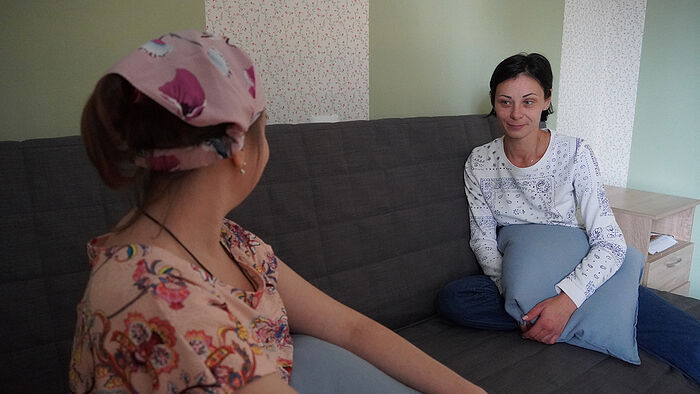On June 26, the International Day of Antidrug Effort, we sat down for a conversation with Bishop Methodius (Kondratyev) of Kamensk and Kamyshlov, the head of the Coordination Center for substance abuse prevention of the Synodal Department for Charity and the head of the management board of the Charitable Foundation in honor of the Holy Righteous Father John of Kronstadt. For the last thirty-five years, Vladyka Methodius’s work was assisting the drug-dependent people. Involved in professional care, he authored the methodology of rehabilitation of drug addicts in a church setting and other written materials in this field, while the coordination center he heads unites under its auspices hundreds of church organizations assisting drug addicts all over Russia.
 Bishop Methodius of Kamensk and Kamyshlov. Photo: press office of the Kamensk Diocese —Vladyka Methodius, you began assisting drug addicts in the 1990s at St. George Church in the Ivanovo Region. How has the church assistance for addicts changed since then?
Bishop Methodius of Kamensk and Kamyshlov. Photo: press office of the Kamensk Diocese —Vladyka Methodius, you began assisting drug addicts in the 1990s at St. George Church in the Ivanovo Region. How has the church assistance for addicts changed since then?
—At that time, the church assistance was, so to speak, strictly limited to the initiatives of individual clergymen. In our days, it is a full-fledged system of assistance that uses a specific methodology, with well-trained staff, and a clear understanding of the problem at hand. We have found an adequate response to the problem of drug addiction, and it was in keeping with the tradition of the Orthodox Church.
—How did you “invent” the methodology of the Church’s help for addicts?
—We were a part of the Church and lived the life of the Church according to the Orthodox tradition. When addicts came to us seeking help, we got them involved in the church life. That’s how our strategy was gradually developed. Once we gained enough experience, the system of providing assistance acquired structure, meaning and versatility. We can boldly say about our methods of offering care: For it seemed good to the Holy Ghost, and to us (Acts 15:28). We did not “invent,” but we saw it and designed it.
—There are dozens of Orthodox rehabilitation centers in Russia. If a drug addict enters such a center, what awaits him there and what will he encounter there?
—He will feel accepted. According to God’s commandment, we will not cast out anyone who comes to us. At the assistance centers, an addicted person will meet those who are trying to live their lives according to the law of love. But God’s love for a man is quite demanding. For example, some people say: Accept me just as I am. But on the contrary: We love you and want you to become what God intended you to be. And we will try very hard to help you become such a person. As for self-damage, self-destruction, or suicide... we will definitely oppose all of that! If you indulge someone’s passions and whims, it is simply the people-pleasing and has nothing to do with love. The staff at the assistance center will treat the disorderliness and arrogance of their charges quite negatively. But they will offer help to overcome weaknesses and solve problems.
—Could you briefly describe the stages of the Orthodox rehabilitation. Why is it so important to go through each stage?
—We have determined that there are three stages of social rehabilitation. However, there is a preliminary stage, where we meet and establish a contact. Therefore, the first stage is called, “Come to your senses.” A person must deal with himself and his addiction within the framework of our understanding of the problem.
The second stage of assistance is, “Come to God.” This is the central value of rehabilitation offered by the Church. We help them to consciously become churched Christians, to build relationship with God, and to participate in the fullness of the church life.
The third stage is, “Return to people.” When a person has solved the problem of addiction and has built his relationship with God, he can go to people and the society in his new capacity. Serious advance preparation precedes this stage. In essence, our charge gradually becomes a new man, with different objectives in life. It won’t be easy for him to defend his new life in the old world. He will have to find new friends and build fundamentally different relationships.
The third stage can be divided into two periods. The first is staying at the rehabilitation center. The next will be outside the center, but with the continued contact with the mentors.
And the last one will be the support stage. Overall, the Church can be seen as a system that accompanies people on their way to the Kingdom of Heaven...
The Church may be seen as a system that accompanies people on their way to the Kingdom of Heaven...
You can’t change the sequence of the rehabilitation stages. It is a mistake for a man to be churched before he has a proper understanding of his problem. Or, if he hasn’t yet learned to live in a community, but, without proper training, he is reintroduced back into the world after the major stage of the rehabilitation.
—What is the goal or a mission of the Church-affiliated substance abuse rehabilitation? Is it when a person stops doing drugs? Or he comes to believe in God?
—Our goal is the one defined by the Lord: that all of us can find salvation and come to know God. Sobriety, freedom from violence of psychoactive substances, and addiction are necessary conditions for a person to come to God. Drunkards… shall not inherit the kingdom of God (1 Cor. 6:10).
—Let’s say, a person has completed the rehabilitation course. What comes next?
—He becomes a participant in church life. According to the saints, its goal was defined as the acquisition of the Holy Spirit. He walks with us along the path of a religious man. He is established even further as a faithful Christian.
—What is the role of a priest in the process of rehabilitation?
—The life of the Church is built around God, and the priest’s primary role is to reveal His image to the congregation. He administers the sacraments, leads in prayer, shepherds his flock, and guides them spiritually. A priest presents the congregation to God and, through him, the congregation receives grace from God through the sacraments, spiritual direction, and prayer. The priest’s role in rehabilitation is identical to that. In our centers, the rehabilitation of drug addicts takes place within a church community and it simply cannot exist without a priest.
—What is the role of a professional psychologist? How can he help?
—A psychologist is a professional. He can be a group leader, because he’s got the special skills to work with people. Clergymen often lack skills necessary to handle the group work, counseling, listening, or talking.
If a psychologist, as an active member of the Church, has learned how to control himself and his professional activity so that it no longer contradicts Orthodox asceticism, such a specialist can really help a priest.
We guide a person to eternal life and the Kingdom of Heaven, whereas the psychologist shows how to adapt to this life. We instruct a man to deny himself as Christ has commanded, whereas a psychologist teaches self-preservation and how to find comfort. A priest and a psychologist can lead him in opposite directions. But if the psychologist has a spiritual life and breathes Orthodoxy, his professional skills will be very useful in the church rehabilitation of drug addicts.
—Today we have hundreds of different organizations in the system of church assistance to drug addicts in Russia; it includes counseling and motivational centers, inpatient and outpatient rehabilitation centers, post-rehabilitation services, support groups for addicts and their families. All this requires a lot of care...
—Yes, we are engaged in continuous training and structuring. We also provide methodological and consulting support. We organize expert visits to help centers and give training seminars in different dioceses. We supervise the development of new centers. By the way, some of them are as good as the ones that have existed for a long time—or even better. It is easier for new centers in such a way that they get off to a good start from early on. Those that opened fifteen or twenty years ago had a tough start; to a great extent, they had to go in blind and act intuitively. As for today, they have an access to a great deal of methodological information and the previous experience of other centers. They have professionals they can learn from and interact with.
—Have you studied international practices of treating addiction? How has it enriched you? What particular experience of the foreign rehabilitation centers has impressed you the most?
—To say that I “studied” the international practices would be rather overstated. I learned about them. I visited about a dozen such centers in the United States. I think it was really important for me to see the work of the New Earth Center in Germany. I learned about the work of the Monar system assistance centers in Poland. When I was in Italy, I visited the San Patrignano Community and a number of other secular and Catholic centers... Having visited several successfully operating centers abroad, I was able to see their strengths.
But, in the end, as we were developing our own methodology, we drew from our tradition and avoided syncretism. Among all the Christian denominations, the Orthodox Church is the only one that has preserved the ancient tradition of asceticism to the fullest extent, so we solved the problem of addiction within this framework. We teach people how to repent—and transform their worldview and mindset. We do this by giving them new knowledge. That’s why we don’t call our charges “rehabilitants.” They are our charges.
—True stories of recovering addicts are the testimonies of God’s help and hope for those suffering from addiction, as well as their loved ones. Please share real-life stories from your experience.
—There are many good ones. Our first charge, when St. George Church parish began taking in addicts on a regular basis, stayed with us for eight months. He became a practicing Christian and returned to a normal life. Later on, he first defended his master’s and later doctoral dissertations. He used to spend vacations with us in Georgievskoye village every summer.
Another charge, who had miraculously escaped imprisonment for theft, fighting, and robbery in the past, changed so much during rehabilitation (as did many others, by the way)! He channeled the communication skills and leadership qualities that helped him steal and manipulate before, but this time for positive outcomes. He got married, started working at the addiction treatment center, and entered the seminary. Later on, because he committed his most grievous sins before baptism, the archbishop found it possible to ordain him. He became a parish priest. He also runs one of our church centers...
Of course, there are stories with sad endings...
—Did it hurt a lot when one of your center’s graduates went back to his or her old ways? Didn’t you get discouraged?
—I didn’t give up, because... I never raised them against anyone. Was I really concerned? I don’t think so. “Let us commit ourselves, and one another, and our whole life to Christ our God.” It is not our job to save them. We simply work to facilitate that process. Whether you are saved or not is ultimately your own choice.
“Our job is to create the conditions for a person to be saved, but whether he is saved or not —he has to see for himself,” said St. Moses of Optina.
It is not only drug addicts who are moving fast toward destruction. There are also those who are at war with God and the Church. But we know that God loves us all and wants everyone to be saved. We surrender ourselves, and each other, and our whole life to Christ our God and in that we find peace. God loves us even more than we can love ourselves. Therefore, God will do everything, as much as possible...
We should look at people positively, without irritation. We shouldn’t draw attention to bad things and we are to take a more relaxed approach to certain things. Not indifferent, but without too much excitement. And we ought to have love, which we were commanded to have.
—Vladyka Methodius, can a child, a drug addict, be someone’s punishment? What should parents do when they notice that a teenager or a young person uses drugs? Is it possible to avoid a drug problem for a family if parents act properly, or is no one immune to this problem?
—A child is always a blessing. But it is also a cross and a responsibility. A child has his own free will. He can go where we wouldn’t want him to go. The Lord our God did not want a man to stray away and taste the fruit of the forbidden tree... But the Lord, Who knows all things, went along with it—He created man, while we bear the children... Sometimes we are happy for our children, but we often grieve about them, too. Still, a child can’t be a punishment.
Man is not a tool for God. We are not toys in His hands. God doesn’t send the disease of addiction to our child to punish us. That is blasphemy.
If a child becomes an addict, it is tragic for God and for us as well. But God does not want to punish that child or us through that child.
There is no way to guarantee that a child won’t start using drugs. A teenager from any family can start trying them. Adam once gave us the wrong example, and well, we also act this way—we break bounds and try things that we shouldn’t.
It is important that when a child stumbles, he gets up again. Certainly, the upbringing and your own example are important. But mistakes do happen. In any case, this is not a reason for despair. There is always a chance left to be saved.
—What should parents do in such a case?
—First of all, you should establish contact with your son or daughter and don’t break it. Scolding and threatening will not help. It would be a good idea to get in touch with professionals who deal with this problem and can offer help.
Such cases occur mostly in socially unstable families. Well, the Church’s method of assisting addicts is precisely about accepting this person into our parish family, where he must find recovery. Therefore, if the primary environment for a successful recovery is the family, then we may have to speculate that his own family, where he became an addict, must be suffering from some spiritual ailment and that said family is not aware of it.
The recovery of a sick family member often begins with the healing of his loved ones who don’t think they are sick. Say, the parents may be able to to adjust their attitudes to some degree —and their child may be given a chance to build the relationship with the parents and pull through it.
—Are all clergy aware of the Church’s comprehensive work to help addicts?
—Unfortunately, they don’t know very much about it. Not just priests, but also bishops. But we do make an effort to spread the information. I go to seminars in different dioceses and talk to people, explaining about the passion of drug addiction, what big mistakes we make when we meet these people, and what church rehabilitation is about. Books, films, photo exhibitions, announcements in churches, seminars... We are doing a lot to make the information about the church assistance to addicts available for a wide Orthodox audience.
We are currently planning to add a special study unit in the pastoral theology course. We will briefly explain in layman’s terms the methodology of rehabilitation of addicts in the church community and talk about the practical work in our assistance centers. This course would be useful for students of theological schools.
—You have devoted many years to helping addicts. What did this work give you personally, what lessons did you learn?
—As a rector of a remote rural parish, I learned that I improved myself by working with drug addicts. I also kept my knowledge current, and it was in great demand. Eventually, my activities led me to... a bishopric. My work of offering the assistance to drug addicts, first at my parish and later at the Synodal Department, was noticed, as was my work with people was also taken into account. I didn’t seek to be an archpastor, but neither did I didn’t count it out. All the more so, because this ministry opened up new opportunities for coordinating and developing the system of help of addicts. Although the position of the director of the Coordination Center is certainly a supplementary activity for me. My diocese was my priority.
—Over the past eleven years, the Charitable Foundation of the Holy Righteous John of Kronstadt, with you as its chairman, has received over one hundred million rubles in the form of government grants and subsidies. In your opinion, were these investments in the development of the church system of care for drug addicts effective?
—The money was not spent in vain. We implemented all of the projects and reported on each one of them.
Grant support allows our Foundation to exist. It financially supports the activities of the Coordination Center in the fight drug addiction of the Synodal Department for Charity. Direct funding and donations are quite modest, and the structure of the Synodal Department has only one “anti-drug” staffing position. Therefore, it is owing to the grants that the Foundation team operates, including running the crisis hotline, conducting seminars, holding Orthodox anti-drug conventions, printing methodological publications, creating video content, and supporting of our website Protivnarko.ru. We carry out the large-scale and rather effective work.
—When we talk about the success of church rehabilitation, people occasionally fall prey to brooding: Here, the Church rehabilitates drug addicts, but the drug mafia gets a lot of new victims addicted, and there is no end to the problem in sight... This means that the anti-drug activity of the Church is nothing but a drop in the ocean of this enormous problem...
—The Lord said: Fear not, little flock; for it is your Father’s good pleasure to give you the kingdom (Lk. 12:32). Active church members are few and far between, but that gives us no reason to become discouraged or despair. Ultimately, we have a commandment to always experience joy. Joy is a truly attainable state. Not a madman’s joy, but a reasonably sober joy. Why, in fact, should we lose heart? The main thing is that there are people who come to us—and we must help them. Give him that asketh thee (Matt. 5:42). After all, we don’t have a commandment to give to the one who doesn’t ask. Sure, only few people seek help at the Church. But we can and we are ready to help those who do and want to labor.
—In the current situation, in connection with the Special Military Operation, a new category of drug addicts has emerged—those who try to drown out their PTSD by using psychoactive substances...
—We are talking not only about those who participated in the military action, but who also ended up in the war zone, who suffered terrible tragedies and received psychological traumas. It is known that such terrible experiences often lead to alcoholism or drug addiction. So, those who went through such tribulations are already showing up in our church centers. Of course, we need new competencies and skills that we haven’t learned yet. We will study hard and strive to provide high-quality assistance to our charges.













